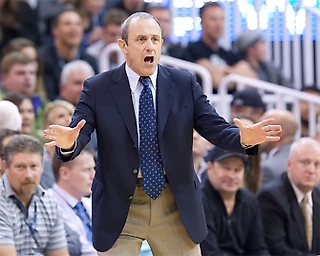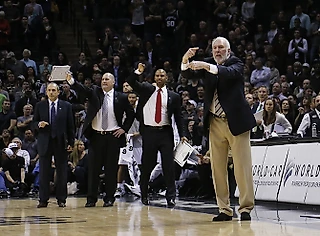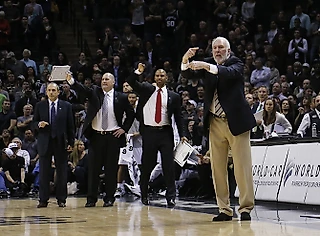A team inside the team
My assistants are what I consider my true team. I never felt being part of the players’ team. I think players should have their privacy, their chemistry, their way of joking and making fun of myself and other coaches. They need to have enough privacy to express their feelings, especially when they are unhappy about my decisions. I don’t believe in being friends with somebody who could decide your playing time or your future in the team. This “friendship” will work when everything goes fine, but once I sit you on the bench, you are not my friend any longer. So I don’t want to provoke this kind of situations.
I became friends with many players I coached. To name a few: Sasha Danilovic, Zoran Savic, Roberto Brunamonti, Antoine Rigaudeau. I consider them my true friends that I can give a call or ask for a support at any moment. But we became friends only after I finished being their coach.
Our coaching staff is a team where I can do things that players do among themselves — like joking, having a pizza after the game, sometimes arguing and blowing off the steam. I’ve been lucky to have great people around me.
With Lele Molin it’s a long story. We won our first national championship together in 1980. We were coaching a U15 Superga team in Mestre. We had an incredible recruiting in the area of Venice and Mestre and we managed to put together a team that was absolutely dominating for 2-3 years. Lele also coached a team that was a year younger. We got close personally and our then girlfriends got close too.
Then, I went to Bologna as an assistant coach. Lele went to Treviso. In Treviso he was the assistant of Zeljko Obradovic who is still his great friend. He won the National championship as the assistant of Mike D’Antoni and another one as the assistant of Petar Skansi. Lele had a chance to work with many coaches who used to be great players. This gave him the opportunity to see the game from a different point of view which is very helpful for me, now that we work together, because I’ve never been a great player myself. He gives me a lot of insights that great players and coaches had.
After we parted our ways, we stayed in touch, but never had a chance to work together until 2000-01. In 2000-01 I offered Lele to come to Bologna and join my long time assistant Giordano Consolini and myself. He accepted it and we made an incredible trio. That season we won the grand slam. We had two great seasons there. When I went to Treviso, I asked him to come back with me. We had another three great seasons. So, finally, when I got this offer from CSKA in 2005, it was a no-brainer to ask him to come here. I really appreciate the fact that together with his wife they considered the opportunity to come and live in Moscow, because this was much more difficult for them. My family is here with me, with the exception of my daughter who studies in University of Venice. His wife is a teacher of foreign language and he has one son and two daughters that are much older than Filippo. They are in the age when you cannot move because they have to finish high-school and go to college. Nonetheless, Lele agreed to come and I think we’ve been having a good time here.
He knows the game very well. He’s calmer and takes more time to think before reacting to anything. He helps me a lot in understanding the game and the players. Lele can be patient when I lose my temper, what happens sometimes.
When Zhenia Pashutin (with whom we are good friends, too) accepted the offer from Spartak Saint-Petersburg, we had the opportunity to get Dima Shakulin. I got to know Dima my first summer here. He was working with Zhenia in the national team. I always appreciated his understanding of basketball, his sense of humor and also his character on the court, where he is active and not afraid to say his opinion or be demanding with the players. Even though I miss working with Zhenia, Dima is giving us some new way of seeing things.
Another addition to our coaching team this summer, David Vanterpool, reminds me a lot of my situation when I was younger and when I started to coach. I feel that some day he will be a great coach. He’s like the son of the industry who is being told “Study well, because one day all this will be yours”. I don’t know whether he realizes that, but he is exactly in that kind of situation. He has a great foundation with his knowledge, his character and his willing to get better. Now, he shows the ability to deal with players maintaining the correct approach. By that I mean setting up the difference between being a former teammate and a coach, which I think is crucial. He managed to find the right distance which enables him to have good relationships with players, but also to be respected as a coach. I really hope that I’ll be able to help him to make all the necessary steps to become a great head coach some day. He also has a great ability to see and understand the game during the game. This is one of the reasons he was a great player. He’s helping us a lot. This year we have an excellent combination of assistants. I joke sometimes telling them that we got one more assistant to make it up for the fact that I’m getting worse as a head coach.
Very few people know that this year my long time friend and a basketball coach from Tel Aviv Moshe Vilk helps us. He is an incredible analyst of the game, analyzing the game not only statistically, but also technically, focusing on the tendencies of the opponent. He’s been helping me out on a personal basis for a long time. Almost every single Final Four he was preparing with my team, always in the shadow, always exchanging opinions. But this year Andrey Vatutin was so nice to invite him to cooperate with us officially.
The credit for a good start we had, going through many difficulties at the time, should go to all my assistants as their role was very important. By the way, I’m still waiting for the rookie dinner of David and Dima. They promised us the rookie dinner. I’m just afraid eventually they will invite us to dinner in some small place in the middle of nowhere to save money ;)
I know I ask a lot from my assistants. But the great thing about our small team is that they try to do everything with a positive attitude which is making up for the fact that sometimes I’m too worried about the way we play. Personally, I’m not so optimistic. Thus adding their attitude to my attitude is very helpful for the team. Plus they do a lot of individual work-outs with players in the morning. Usually, Lele and Dima take care of the big men, and David takes care of our young guards. Nikos Zisis is now playing with more confidence and more aggressiveness thanks to David’s help. David showed him how to combine personal aggressiveness to score with the need to coordinate the team. I’m happy with the progress Nikos has made, and I keep joking with David that now he should help Keyru and Shved to make it to the next level.
Being my assistant is not so difficult, but at the same time it might be difficult. I don’t disturb anybody past usual working hours. I’m not calling people in the night. After the game I’m so tired that I just watch the game myself to clarify my ideas, then I need to sleep. Even if I’m mad or stressed, I can’t go all night long watching tapes. I need to rest as I wake up early every morning — 7.30 or maximum 8 a.m. — even after the game. But I want them to suggest new ideas. During practices when we set up the teams I want them to create problems to the team I’m coaching. I want them to create situations that look like the real game. I want them to imagine how the opponent will play and try to recreate this kind of problem during practices. I want them to come up with new ideas and be ready to express and defend them, but at the same time to accept the fact that it will be my decision whether to use their ideas or not. The greatest quality of an assistant coach is unselfishness. Once you start being jealous that the coach used your idea that turned to be the key for the game and got all the credit without mentioning you, you’re no longer a good assistant. I used to be an assistant. When I started thinking that I could do it my way, I was lucky that I had the chance.
At the same time head coach should never confuse loyalty with an ability to follow and agree. A good assistant should be able to tell the coach: “Look, we’re heading into the wrong direction” and explain why. You have to tell, if you see the coach choosing the wrong direction. I had very few problems with my assistants during my career. And it happened only when I had a “master of the after” as an assistant. Those are the people who are good at saying “We should have done this” after the game and “Maybe, we should do something about it” when things are not going well. Do what? Make your suggestion.
We disagree with my assistants all the time, which I think is a good part of our job. In theory they call “organizational behavior”, they point out that group thinking (making decisions together that in most cases leads to thinking in almost the same way) might be a big problem. In group thinking, the one who disagree avoids expressing his opinion because of the fear of being criticized. It might be a disaster for the organization. So if there is a good thing I do as a coach, I don’t encourage group thinking. I keep pushing my assistants to tell what is wrong in their opinion to create some kind of diversity. If we all think in the same way, I don’t need assistants. On the other hand, we do a lot of brainstorming, on the bus, even on the bench during games. There is one reason I sit between my assistants from day one as a head coach. I want my assistants to talk and then it’s my responsibility to pick up what I feel is good. During the game I never explain to them why I chose something over something else, because we don’t have time for that. But I want to hear their voice.
We are lucky to have respectful and reserved fans here in Moscow, because in Bologna I had 8-9 thousand assistant coaches on the stands telling me what to do. It was difficult to isolate myself. We were lucky to win most of the games. In my first year, we were doing very well, it was a great season, so at one point I was in such a good mood that when some guy from the stands told me “Put this one”, I looked at him and said “That’s a good idea! I’m going to do it right away” and I did it. But now I doubt I could do that again.






